CHINAS SENT-DOWN GENERATION
Public Management and Change Series
Beryl A. Radin, Series Editor
Editorial Board
Robert Agranoff | William Gormley |
Michael Barzelay | Rosemary OLeary |
Ann OM. Bowman | Norma Riccucci |
H. George Frederickson | David H. Rosenbloom |
Titles in the Series
Challenging the Performance Movement: Accountability, Complexity, and Democratic Values
Beryl A. Radin
Charitable Choice at Work: Evaluating Faith-Based Job Programs in the States
Sheila Suess Kennedy and Wolfgang Bielefeld
Collaborating to Manage: A Primer for the Public Sector
Robert Agranoff
The Collaborative Public Manager: New Ideas for the Twenty-first Century
Rosemary OLeary and Lisa Blomgren Bingham, Editors
The Dynamics of Performance Management: Constructing Information and Reform
Donald P. Moynihan
Federal Management Reform in a World of Contradictions
Beryl A. Radin
The Future of Public Administration around the World: The Minnowbrook Perspective
Rosemary OLeary, David M. Van Slyke, and Soonhee Kim, Editors
The Greening of the US Military: Environmental Policy, National Security, and Organizational Change
Robert F. Durant
High-Stakes Reform: The Politics of Educational Accountability
Kathryn A. McDermott
How Information Matters: Networks and Public Policy Innovation
Kathleen Hale
How Management Matters: Street-Level Bureaucrats and Welfare Reform
Norma M. Riccucci
Implementing Innovation: Fostering Enduring Change in Environmental and Natural Resource Governance
Toddi A. Steelman
Managing within Networks: Adding Value to Public Organizations
Robert Agranoff
Measuring the Performance of the Hollow State
David G. Frederickson and H. George Frederickson
Organizational Learning at NASA: The Challenger and Columbia Accidents
Julianne G. Mahler with Maureen Hogan Casamayou
Program Budgeting and the Performance Movement: The Elusive Quest for Efficiency in Government
William F. West
Public Administration: Traditions of Inquiry and Philosophies of Knowledge
Norma M. Riccucci
Public Values and Public Interest: Counterbalancing Economic Individualism
Barry Bozeman
The Responsible Contract Manager: Protecting the Public Interest in an Outsourced World
Steven Cohen and William Eimicke
Revisiting Waldos Administrative State: Constancy and Change in Public Administration
David H. Rosenbloom and Howard E. McCurdy, Editors
CHINAS SENT-DOWN GENERATION
Public Administration and the Legacies of Maos Rustication Program
HELENA K. RENE
2013 Georgetown University Press. All rights reserved. No part of this book may be reproduced or utilized in any form or by any means, electronic or mechanical, including photocopying and recording, or by any information storage and retrieval system, without permission in writing from the publisher.
Library of Congress Cataloging-in-Publication Data
Rene, Helena K.
Chinas sent-down generation : public administration and the legacies of Maos rustication program / Helena K. Rene.
p. cm.
Includes bibliographical references and index.
ISBN 978-1-58901-987-4 (pbk. : alk. paper)
1. Urban youthGovernment policyChinaHistory20th century. 2. Forced migrationChinaHistory20th century. 3. Urban-rural migrationGovernment policyChinaHistory20th century. 4. Administrative agenciesChinaEvaluation. I. Title.
HQ799.C55R37 2012
305.2350951'091732dc23
2012038648

This book is printed on acid-free paper meeting the requirements of the American National Standard for Permanence in Paper for Printed Library Materials.
20 19 18 17 16 15 14 13 9 8 7 6 5 4 3 2
First printing
This book is dedicated
To my father, Mark A. Rene, who taught me, age thirteen, my first words in English when we first immigrated to the United States;
To my mother, Zhang Wei, who taught me to always dare to dream the impossible;
To all the first-generation Chinese immigrants who aspire to achieve the American dream;
To the people of China whose resilience and spirit will always live on;
To China, a nation of 1.3 billion, once ravaged by wars and decades of political turbulence but that now stands tall and thrives on the world stage;
And to the United States, a land of opportunities that has given me so much, a nation indivisible, with liberty and justice for all.
Contents
Illustrations
Tables
Figures
Photographs
Boxes
Preface
This book is about the public administration of the 196878 Chinese Cultural Revolution Up to the Mountains and Down to the Countryside program for socialist reeducation that sent seventeen million urban Chinese youth to rural communes, state and military farms, and the Inner Mongolian grasslands for periods ranging from a few years to lifeor death. These youth, known as sent-downs, typically labored for long hours under harsh conditions, frequently suffered constant hunger, and were vulnerable to injury and disease. Physical abuse was common, and many women were subject to sexual harassment, predation, and rape. Collectively, the sent-downs are now referred to as Chinas lost generation because their adolescence and life courses were thoroughly disrupted as their social, educational, and economic opportunities were severely truncated. For many, four words encapsulated their experience: We were the oxen. Nevertheless, many of Chinas current leaders, including president Xi Jinping and prime minister Li Keqiang, were tempered by the program and thrived after completing it.
The Up to the Mountains and Down to the Countryside campaign, also known as the rustication program, was a large-scale socioeconomic policy intervention that, overall, produced downward mobility for the sent-down youth. In 1978 China scholar Susan Shirk observed that one is struck with the lack of constituencies for the transfer program: the city teenagers and their parents dont like it; the peasants dont like it; the scientific-intellectual establishment doesnt like it; the [Chinese Communist] Party and Army cadres who are parents dont like it and asked what explains the governments capacity to carry out the program despite the lack of support?
Based largely on extensive interviews with fifty-four former sent-downs and others whose lives were affected by the rustication program or parallel policies, the book provides a surprising answer. In the midst of the turmoil of the Cultural Revolution, the highly efficient design, organization, and implementation of the program cast a wide net from the central government to the front doors of the individual apartments in which the urban youth lived and from the national capital in Beijing down to very remote rural areas. The public administration of the Up to the Mountains and Down to the Countryside campaign left eligible urban youth with virtually no viable means of elusion or circumvention, except for the limited number who were able to join the military, generally based on their parents personal connections. In fact, due to the programs design, which publicized it as a great adventure to promote revolutionary socialism, many urban youth were anxious to be sent down. While highly efficient on the sending side, the program more frequently fell short on the receiving end in the rural communes, state and military farms, and, to a lesser extent, on the grasslands of Inner Mongolia. The rustication bureaucracy did not always perform well in protecting the sent-downs from abuse and misfortune, providing socialist reeducation, and, for those sent to rural villages, settling the youth into their new locations and integrating them with the peasantry.

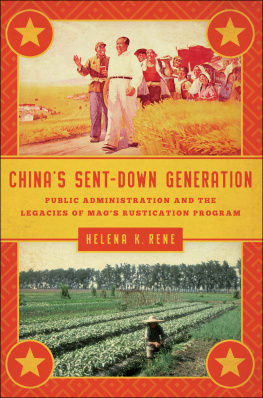

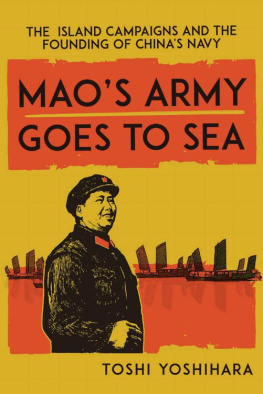

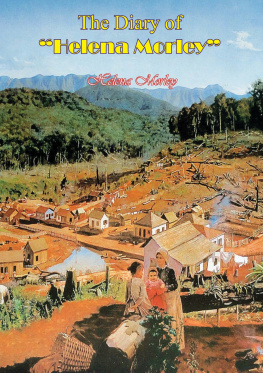
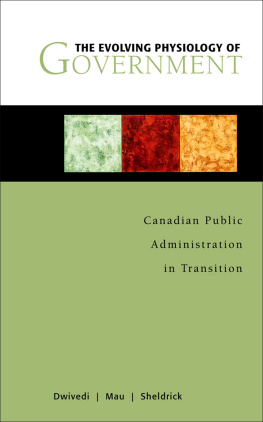
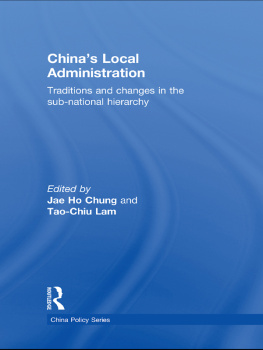
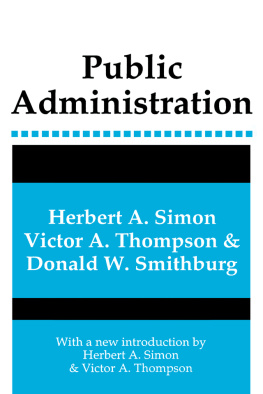
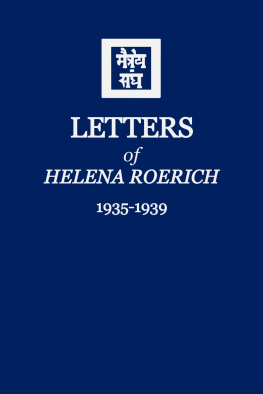




 This book is printed on acid-free paper meeting the requirements of the American National Standard for Permanence in Paper for Printed Library Materials.
This book is printed on acid-free paper meeting the requirements of the American National Standard for Permanence in Paper for Printed Library Materials.